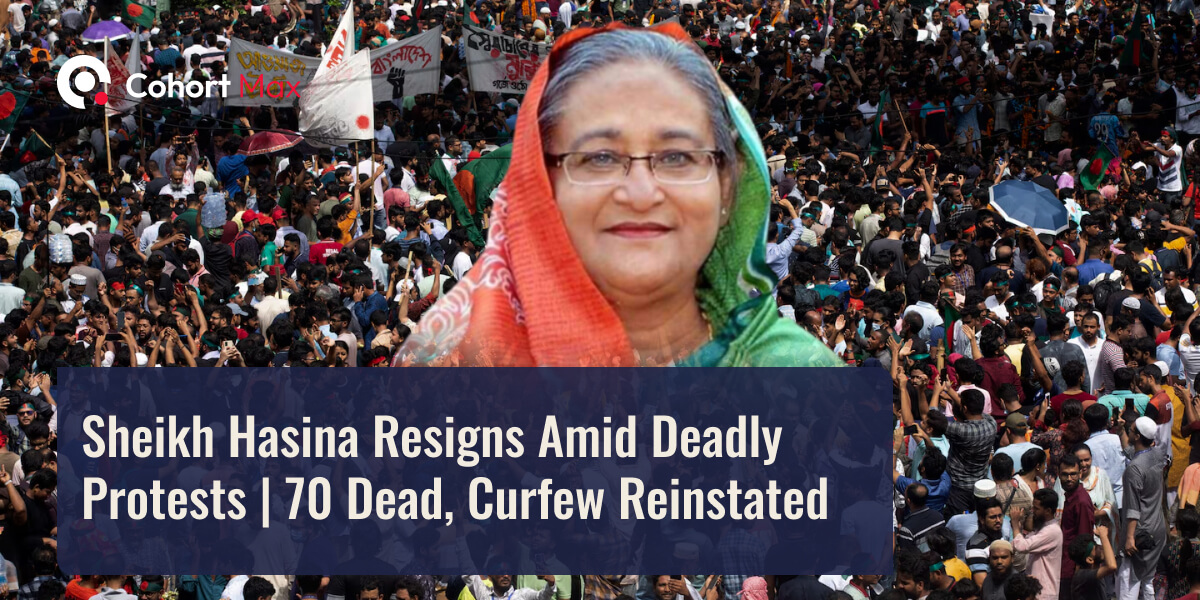Sheikh Hasina Resigns Amid Deadly Protests | 70 Dead, Curfew Reinstated
| Latest Update Bangladesh Army Chief Waker-uz-Zaman has announced the formation of an interim government amidst rising unrest and Prime Minister Sheikh Hasina’s reported departure. |
Dhaka, Bangladesh – In a dramatic turn of events, Prime Minister Sheikh Hasina has resigned and left Bangladesh amid intensifying nationwide protests led by students against government job quotas. The unrest, which has resulted in significant violence and a heavy crackdown by security forces, has plunged the South Asian nation into a deep political crisis.
The death toll in Bangladesh has surged as clashes between security forces and protesters left over 70 people dead on Sunday. The government imposed a new curfew and internet restrictions to quell the growing antigovernment movement. The violence erupted as student protests against a government job quota system intensified, morphing into widespread unrest against Prime Minister Sheikh Hasina’s leadership.
Sunday marked the deadliest day since the protests began in July, with a diplomatic official in Dhaka confirming at least 72 deaths. Local media and protest organizers reported death counts ranging from 70 to 93. Among the dead were 13 police officers, highlighting the severe nature of the clashes.
Prime Minister Hasina labeled the protesters as “terrorists” and called for the public to curb the “anarchists” with “iron hands.” She has been increasingly seen as authoritarian, with the protests now reflecting broader dissatisfaction with her government and economic management.
Army Chief General Waker-Uz-Zaman announced the formation of an interim government to manage the country’s affairs following Hasina’s departure. In a televised address, General Zaman declared,
“There is a crisis in the country. I have met Opposition leaders, and we have decided to form an interim government to run this country. I take all responsibility and promise to protect your life and property.”
In an attempt to quell the demonstrations, the government imposed a nationwide curfew and a near-total internet blackout. Despite the curfew being eased for two hours on Saturday to allow residents to shop for essentials, the streets of Dhaka remain largely deserted with military personnel and police patrolling key areas.
The protests, initially sparked by the High Court’s order to reinstate a quota reserving 30% of government jobs for families of veterans, have been further fueled by economic instability. Rising food prices, high unemployment rates, and widespread frustration among the youth have drawn ordinary citizens to join the student-led demonstrations.
The resignation of Sheikh Hasina Wazed marks the biggest political upheaval in Bangladesh since her re-election for a fourth term earlier this year. Hasina had canceled planned trips to Spain and Brazil to address the escalating crisis. The government has arrested numerous opposition leaders and activists who had expressed support for the protesters.
India’s Ministry of External Affairs has facilitated the return of nearly 1,000 Indian nationals from Bangladesh, and approximately 4,000 more students are receiving consular assistance. The international community is closely monitoring the situation, with concerns over the human rights implications of the government’s crackdown.
Future Uncertainties
General Zaman has pledged to talk to the president and form an interim government, holding discussions with opposition parties and civil society members. He emphasized the need for calm and cooperation, urging the public to support the interim administration to restore stability.
As Bangladesh grapples with this unprecedented crisis, the coming days will be critical in determining the nation’s political and social trajectory. The interim government’s actions and the protesting populace’s response will shape the future of this South Asian country.
Suggested Reads
Lahore Hit by Record Rain in Just 3 Hours – A 2024 Catastrophe
Hamas Leader Ismail Haniyeh Assassinated in Tehran Amid Rising Tensions







